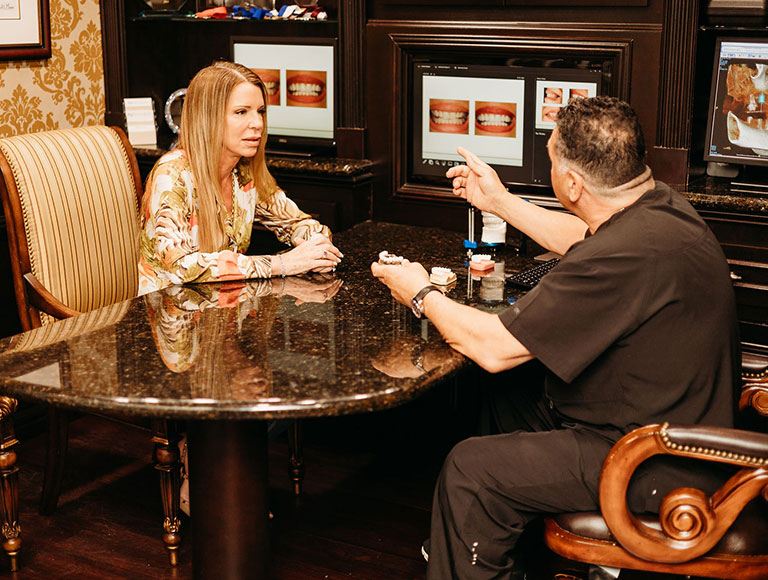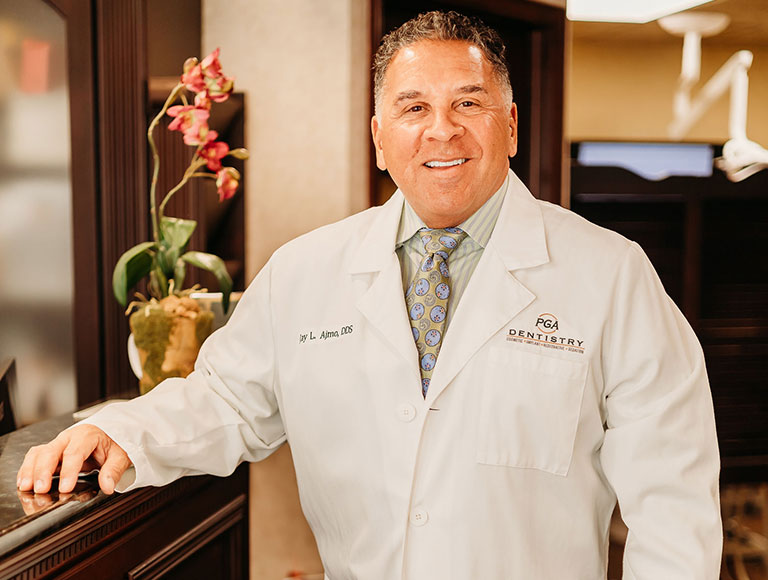Let Our Top-Rated Palm Beach Gardens Transform Your Smile with Dental Implants

Missing teeth can significantly impact your life, affecting your ability to eat, speak, and smile confidently. At PGA Dentistry, we understand the challenges associated with tooth loss and offer a revolutionary solution: dental implants.
Learn more about your tooth replacement options from our Palm Beach Gardens dentist today with a complimentary consultation. Call us at (561) 627-8666.
The Top Benefits of Dental Implants
-
Preservation of Jawbone Health
One of the most significant benefits of a dental implant is that it prevents bone loss. When a tooth is missing, the jawbone in that area deteriorates, leading to other problems. During a dental implant procedure, the implant is surgically placed in the jawbone and fuses with the bone over time, providing a strong and stable foundation for the replacement tooth. Successful implant placement preserves the integrity of the jawbone and prevents further bone loss.
-
Improved Self-Esteem
A dental implant can significantly improve self-esteem and confidence by replacing missing teeth and restoring a patient’s natural appearance. Missing teeth or gaps in the smile can cause embarrassment and self-consciousness, leading to a decrease in self-esteem. Dental implants provide a permanent solution to missing teeth that look and function like natural teeth, helping create an improved appearance and better quality of life.
-
Looks, Feels, and Acts Like Natural Teeth
Known as the best dental restorative option, dental implants look, feel, and act like natural teeth. They mimic the natural tooth from root and crown and are custom-made to match the shape, size, and color of the nearby teeth, making them virtually indistinguishable from your natural, neighboring teeth. This means that people won’t be able to tell that you have dental implants, and you can feel confident when you smile.
-
Restores Bite Force
Dental implants also restore bite force, allowing you to eat the foods you love without discomfort or difficulty. Dentures and dental bridges can affect your ability to bite and chew certain foods, but dental implants are anchored securely in the jawbone and provide a stable base for the artificial tooth, allowing you to enjoy a wide variety of foods without restrictions.
-
Improves Speech and Eating Abilities
Dental implants can also improve speech and eating abilities. Dentures can slip and move in the mouth, causing difficulty with speech and eating. Dental implants, however, are anchored securely in the jawbone, providing a stable base for the replacement tooth, which can improve speech and eating abilities.
-
Easy to Care for
Dental implants are also easy to maintain. They don’t require special care and can be brushed and flossed like natural teeth. Remember to maintain good oral hygiene to keep the implant and the surrounding teeth healthy, but there’s no need for any additional care or maintenance. With implant success rates sitting around 95%, you’ll have a long-lasting tooth replacement as long as you care for them properly.
Our Palm Beach Gardens dentist created a helpful guide on how to maintain your dental implants and achieve good oral health so you can enjoy their benefits for years to come.
-
Can Last a Lifetime
Dental implants are also a long-term dental restoration option. They’re designed to last a lifetime with proper care and maintenance. While the implant is made of biocompatible materials designed to fuse with the jawbone, the replacement tooth that’s attached to the jawbone below the implant may need to be replaced or restored over time, but the implant post itself can last a lifetime.
-
Improves Oral Health
Dental implants can improve oral health. When a tooth is missing, it can lead to other problems with adjacent teeth, including shifting, bite problems, and jawbone deterioration. Dental implants prevent these problems by filling the gap left by the missing tooth and preserving the integrity of adjacent teeth and the jawbone.
-
Durable
Dental implants are also highly durable. They’re made of biocompatible materials designed to fuse with the jawbone, providing a strong and stable foundation for the replacement tooth. They’re also resistant to tooth decay and periodontal disease, making them an excellent option for people looking for a long-term solution for healthy teeth.
-
No Slipping As They’re Non-Removable
Dental implants are non-removable, which means they won’t slip or move in the mouth. They’re anchored securely in the jawbone, providing a stable base for the replacement tooth. This eliminates the discomfort and embarrassment of the false teeth of traditional dentures, which can slip and move in the mouth.
Frequently Asked Questions
-
What is the downside of dental implants?
While the benefits tend to outweigh the drawbacks, dental implants do require a surgical procedure. However, the complication rate is around 5%. Risks of implant surgery include infection, implant failure, delayed healing, nerve damage, or harm to adjacent teeth. These issues are rare with proper care, but factors like smoking or poor oral hygiene can increase risks, potentially leading to peri-implantitis or bone loss.
Choosing a skilled implant specialist, like Dr. Ajmo, minimizes complications and enhances success rates. Maintaining diligent oral hygiene and regular dental visits every six months further reduces these downsides, ensuring long-term implant durability.
-
Does a dental implant set off metal detectors?
Dental implants, typically made of titanium, are unlikely to trigger metal detectors because titanium is non-magnetic and biocompatible. Whether at airports or security checkpoints, implants are too small to register, allowing hassle-free travel. In rare cases, multiple implants or additional dental hardware might cause a minor alert, but a quick explanation resolves any concerns. This reliability makes implants a practical choice for those seeking a discreet, worry-free solution for missing teeth.
-
Do dental implants get cavities?
Dental implants cannot develop cavities because their titanium posts and porcelain or ceramic crowns are resistant to decay, unlike natural teeth. However, plaque can still accumulate on implants, potentially causing gum inflammation or peri-implantitis if not addressed with proper oral hygiene. Brush twice daily with a low-abrasive toothpaste and floss regularly to protect surrounding gums and natural teeth. Regular dental cleanings with PGA Dentistry every six months ensure implants and your overall oral health remain in top condition.
-
Can I drink coffee after getting dental implants?
Avoid drinking coffee for the first 48–72 hours after implant surgery, as the heat can irritate the healing site and caffeine may interfere with recovery by constricting blood vessels. After healing, coffee is perfectly safe to drink. While implant crowns are stain-resistant, they’re not immune to discoloration from frequent exposure. Unlike natural teeth, they can’t be whitened, so moderation and steadfast dental hygiene are key.
-
Can you chew steak with dental implants?
After full healing (typically three to six months), dental implants let you chew tough foods like steak effortlessly. Their titanium posts that fuse with the jawbone mimic the strength of natural teeth. Unlike dentures, implants stay secure under pressure, allowing you to enjoy a varied diet without worry.
Achieve Your Dream Smile with Dental Implants!

To learn more about implant benefits and if you’re a candidate for dental implants, contact PGA Dentistry today. Rediscover your smile today by contacting our Palm Beach Gardens dental office to schedule your complimentary consultation. Call (561) 627-8666.
We can’t wait to help you transform your smile and quality of life.

Complimentary Consultation
or 2nd Opinion
- Exam
- Full mouth X-rays
- Private Consultation with Doctor ($450value)
- 7100 Fairway Dr Ste 59,
Palm Beach Gardens, FL 33418 - (561) 627-8666
- Monday: 8am - 5pm
- Tuesday: 8am - 5pm
- Wednesday: 8am - 5pm
- Thursday: 8am - 5pm
- Friday: 8am - 1pm
- Saturday & Sunday: Closed